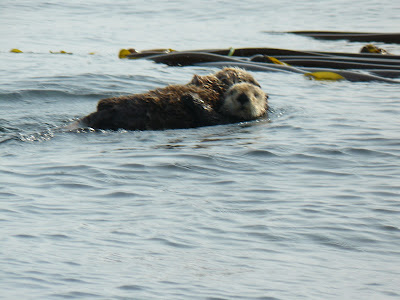A beautiful Indian Pipe fungus near Beaver Creek, Port Alberni
Moss in the forest on the banks of the Stamp River, Beaver Creek
Marina in Uclulet, West Coast of Vancouver Island
On the second day of our visit to the west coast we signed up for boat trip to the Hot Springs about 2 hours boat ride north of Tofino. This is the wharf on the morning of that trip. Notice the sea fog coming in.
A Sea Lion basking in the sun with a Kelp bed in the foreground.
A Sea Otter with baby hiding in a bed a kelp. In the first few hours after a baby otter is borne it is unable to swim so the mother must stay on the surface with it.
Hot Springs Point Lighthouse, two hours north of Tofino. There is a permanant Indian community just around the point.
The Indian community of Hotsprings Point. The original village was located closer to the water but was wiped out in the Tsunami of 1964.
This is an example of how a new tree will start out on a Host Log (one which has fallen and is rotting away) and develop into a mature tree while the host log rots to nothing. Note the timber walkway. The entire 1.8 km walk to the hot spring was like this.
A Garter Snake basking in the sun alonside the walkway.
The hot spring falls and bathing pool. The water issues from the spring at 50 deg C. The pools were quite small and communal bathing was an intimate affair.
Wild Ginger and moss in a rotting log alongside the walkway to the hot springs.
An Old Growth Cedar tree alongside the walkway.
A Black Bear hunting for limpets on a rocky beach. Her cub had just run back into the forest. We were about 10 metres away in the boat.
We passed a barge loaded with cedar timber cut ready to make roof shingles.
Long Beach near Tofino with the sea fog rolling in on a fine day.
two surfers coming out of the distant surf through the sea fog.
Well this is the last of my blog entries so I will sign off now until I return to Australia. I hope you have enjoyed sharing my adventures over the last two months.



























